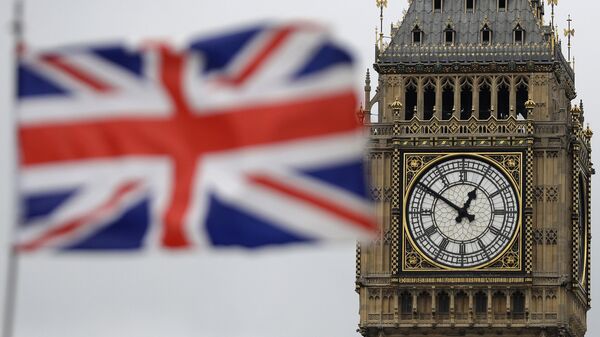In turn, Boris Johnson reaffirmed the notion that there is still ample time to debate the UK’s departure from the EU before the House of Commons is suspended.
Alistair Jones, Associate Professor and University Teaching Fellow in the Department of Politics at De Montfort University Leicester, expressed his view on Boris Johnson’s decision to prorogue parliament and the possibility of no deal Brexit.
Sputnik: Is Boris Johnson’s move to prorogue parliament anti-democratic?
Alistair Jones: To conflate the move to prorogue parliament with democracy is slightly problematic because it’s actually technically a royal prerogative, although it is one that is wielded by the Prime Minister, so every year when we have the Queen’s speech, and in effect parliament gets prorogued; it may only be for a day or for a few hours, when in effect the end of one session finishes and the new term starts with the Queen’s speech, so prorogation is actually part of our normal annual process.
Where this is problematic; is that Boris Johnson has decided to prorogue parliament early, with the Queen’s speech normally being in November, so in doing this he is putting down a challenge to parliament.
You can argue whether parliament is being democratic in contesting the will of the people with regard to the Brexit vote, but in terms of what prorogation is doing; he is challenging parliament, he is saying this is what he is doing and he is challenging parliamentary processes.
What appears to be the case is that the only way this can be challenged effectively is through the courts, where the argument is that Boris Johnson has actually acted in a manner that is abusing the power to prorogue parliament.
How this impacts upon democracy, the reality is that it doesn’t. Our democratic processes carry on regardless, we elect MPs and they represent us in parliament, the issue we have with our system of parliamentary democracy, is that it is normally controlled by the government; when there is a minority government, it is very difficult for the government to get their way in anything, as can be seen with Theresa May’s government, and Boris Johnson has found a constitutionally approved method to get his own way, which is a no deal Brexit.
Sputnik: Is a no deal Brexit now inevitable?
Alistair Jones: The inevitability of a no deal Brexit can still be challenged. It is possible still for parliament to vote to instruct the government of the day to ask for an extension, or even to revoke Article 50 if the EU will not give us an extension, so it is not a done deal, but it is the most likely alternative at the moment.
As to the impact that it’s going to have; the leaked documentation Operation Yellowhammer, which has been presented by the government after the leak saying that that’s our worst case scenario, it transpires that it’s not, it’s the expected scenario, not the worst case, so Philip Hammond saying that it’s going to be really bad, potentially yes.
We have to bear in mind that with a no deal Brexit, the hard border in Ireland comes into play immediately, a hard border would immediately come into play at Calais or Dover, so we are going to have a lot of hard borders, and there’s going to be a lot of problems with regard to the transportation of for example, food products and medicines into and out of the country.
Philip Hammond is probably overstating it a bit, but the reality is that most businesses that have dealings with the EU are really worried because they don’t know, and it’s this lack of knowledge that is probably the greatest concern, rather than the no deal itself.
Sputnik: Would Boris Johnson lose a vote of no confidence?
Alistair Jones: If there was to be a vote of no confidence the day parliament returns; he is most likely to lose. The numbers give him a one seat majority, but that’s with all the DUP voting for him and there’s a number of Conservative MPs who are furious with what he has done, in particular those who received a letter from him saying that he would never use such procedures as proroguing parliament to get a no deal Brexit through.
There’s a number of MPs on the Tory benches that will probably vote against him, and there’s probably a greater number of those than there are Labour Brexiteers who would vote with him to get a no deal Brexit through the House, so if there is a vote of no confidence; he is most likely to lose it.
The views and opinions expressed by the speaker do not necessarily reflect those of Sputnik.

